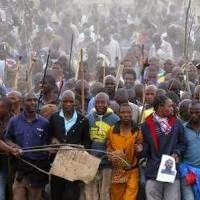
Africa’s progressive future must reject Bretton Woods-IMF-World Bank-Washington Consensus oppression
From a Zambian’s interview with Press TV
[Built] …using African’s toil, African sweat, African labor, African intellect from slavery to colonization and now we have foreign investment, which comes with tax dodging and land grabs - always taking away from Africa.

“We have let other people control the economy, that is why we are so rich – and yet so poor,” Zambian Justina Mutale said in an interview last fall with Press TV.

With the 15-member states Southern African Development Community (SADC) together with the whole of Africa, Mutale said, “We have the bargaining power, if only African leaders can realize that. We have what it is that builds the world, that which has always built the world.”

 Mutale recalled her homeland “soon after independence. She
said “Our own President Kaunda (Kenneth David Kaunda, Zambia’s first president,
1964-1991) and his government embarked on what we called ‘Zambianization’ in
which he hoped that eventually Zambians would be able to take over the
industries, take over the management of everything that we needed to do.”
Mutale recalled her homeland “soon after independence. She
said “Our own President Kaunda (Kenneth David Kaunda, Zambia’s first president,
1964-1991) and his government embarked on what we called ‘Zambianization’ in
which he hoped that eventually Zambians would be able to take over the
industries, take over the management of everything that we needed to do.”
A
|
 fter Zambian independence, Mutale said, President Kaunda and
his government insisted that there must be an emphasis on “free education for all – every school, growing
child was eligible to be educated free of
charge by the government.” She said there was a governmental provision for “free health … to keep people healthy and
to educate people.”
fter Zambian independence, Mutale said, President Kaunda and
his government insisted that there must be an emphasis on “free education for all – every school, growing
child was eligible to be educated free of
charge by the government.” She said there was a governmental provision for “free health … to keep people healthy and
to educate people.” The term
Washington Consensus coined in 1989 by English economist John Williamson
references a set of 10 relatively specific economic policy prescriptions Williamson
considered the ‘standard’ reform package promoted by Washington, D.C.–based
institutions such as the International Monetary Fund (IMF), World Bank, and the
US Department of the Treasury – “for crisis-wracked developing countries.” Among these imposed prescriptions (brutishly disregarding indigenous needs and traditions, skills and talents) were: “macroeconomic
stabilization, economic opening with respect to both trade and investment, and the expansion of market forces
within the domestic economy.” [Wikipedia]
The term
Washington Consensus coined in 1989 by English economist John Williamson
references a set of 10 relatively specific economic policy prescriptions Williamson
considered the ‘standard’ reform package promoted by Washington, D.C.–based
institutions such as the International Monetary Fund (IMF), World Bank, and the
US Department of the Treasury – “for crisis-wracked developing countries.” Among these imposed prescriptions (brutishly disregarding indigenous needs and traditions, skills and talents) were: “macroeconomic
stabilization, economic opening with respect to both trade and investment, and the expansion of market forces
within the domestic economy.” [Wikipedia] The Bretton
Woods system of monetary management – the first example of a monetary
order to govern monetary relations among independent nation-states – is known
for having established global rules for commercial and financial relations
among major industrial states in the mid-20th century. Chief features of the Bretton Woods system oblige
countries “to adopt a monetary policy that maintains the exchange rate” by tying
currencies to gold and enabling “the IMF to bridge temporary imbalances of
payments.” [Wikipedia]
The Bretton
Woods system of monetary management – the first example of a monetary
order to govern monetary relations among independent nation-states – is known
for having established global rules for commercial and financial relations
among major industrial states in the mid-20th century. Chief features of the Bretton Woods system oblige
countries “to adopt a monetary policy that maintains the exchange rate” by tying
currencies to gold and enabling “the IMF to bridge temporary imbalances of
payments.” [Wikipedia]
B
|
______________________________________________________
A lifelong American writer and writer/activist (former academic and staffer with the U.S. government in Washington), Dr. Carolyn LaDelle Bennett is credentialed in education and print journalism and public affairs (PhD, Michigan State University, East Lansing, Michigan; MA, The American University, Washington, DC). Her work concerns itself with news and current affairs, historical contexts, and ideas particularly related to acts and consequences of U.S. foreign relations, geopolitics, human rights, war and peace, and violence and nonviolence. Dr. Bennett is an internationalist and nonpartisan progressive personally concerned with society and the common good. An educator at heart, her career began with the U.S. Peace Corps, teaching in Sierra Leone, West Africa. Since then, she has authored several books and numerous current-affairs articles; her latest book: UNCONSCIONABLE: How The World Sees Us: World News, Alternative Views, Commentary on U.S. Foreign Relations; most thoughts, articles, edited work are posted at Bennett’s Study: http://todaysinsightnews.blogspot.com/ and on her Facebook page https://www.facebook.com/carolynladelle.bennett. http://www.prweb.com/releases/2014/08UNCONSCIONABLE/prweb12131656.htm http://bookstore.xlibris.com/Products/SKU-000757788/UNCONSCIONABLE.aspx Her books are also available at independent bookstores in New York State: Lift Bridge in Brockport; Sundance in Geneseo; Dog Ears Bookstore and Literary Arts Center in Buffalo; Burlingham Books in Perry; The Bookworm in East Aurora
______________________________________________________






No comments:
Post a Comment